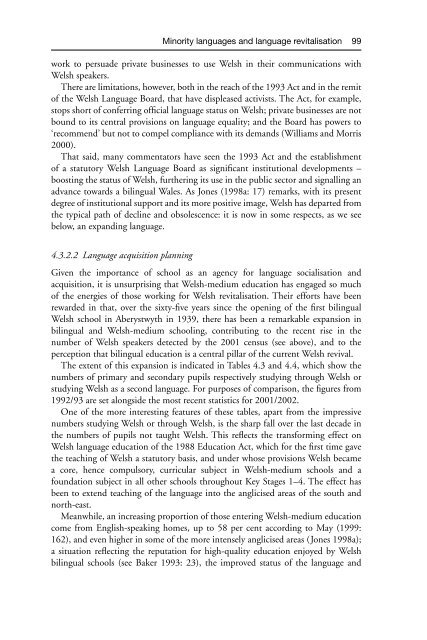Gibson Ferguson Language Planning and Education Edinburgh ...
Gibson Ferguson Language Planning and Education Edinburgh ...
Gibson Ferguson Language Planning and Education Edinburgh ...
You also want an ePaper? Increase the reach of your titles
YUMPU automatically turns print PDFs into web optimized ePapers that Google loves.
Minority languages <strong>and</strong> language revitalisation 99<br />
work to persuade private businesses to use Welsh in their communications with<br />
Welsh speakers.<br />
There are limitations, however, both in the reach of the 1993 Act <strong>and</strong> in the remit<br />
of the Welsh <strong>Language</strong> Board, that have displeased activists. The Act, for example,<br />
stops short of conferring official language status on Welsh; private businesses are not<br />
bound to its central provisions on language equality; <strong>and</strong> the Board has powers to<br />
‘recommend’ but not to compel compliance with its dem<strong>and</strong>s (Williams <strong>and</strong> Morris<br />
2000).<br />
That said, many commentators have seen the 1993 Act <strong>and</strong> the establishment<br />
of a statutory Welsh <strong>Language</strong> Board as significant institutional developments –<br />
boosting the status of Welsh, furthering its use in the public sector <strong>and</strong> signalling an<br />
advance towards a bilingual Wales. As Jones (1998a: 17) remarks, with its present<br />
degree of institutional support <strong>and</strong> its more positive image, Welsh has departed from<br />
the typical path of decline <strong>and</strong> obsolescence: it is now in some respects, as we see<br />
below, an exp<strong>and</strong>ing language.<br />
4.3.2.2 <strong>Language</strong> acquisition planning<br />
Given the importance of school as an agency for language socialisation <strong>and</strong><br />
acquisition, it is unsurprising that Welsh-medium education has engaged so much<br />
of the energies of those working for Welsh revitalisation. Their efforts have been<br />
rewarded in that, over the sixty-five years since the opening of the first bilingual<br />
Welsh school in Aberystwyth in 1939, there has been a remarkable expansion in<br />
bilingual <strong>and</strong> Welsh-medium schooling, contributing to the recent rise in the<br />
number of Welsh speakers detected by the 2001 census (see above), <strong>and</strong> to the<br />
perception that bilingual education is a central pillar of the current Welsh revival.<br />
The extent of this expansion is indicated in Tables 4.3 <strong>and</strong> 4.4, which show the<br />
numbers of primary <strong>and</strong> secondary pupils respectively studying through Welsh or<br />
studying Welsh as a second language. For purposes of comparison, the figures from<br />
1992/93 are set alongside the most recent statistics for 2001/2002.<br />
One of the more interesting features of these tables, apart from the impressive<br />
numbers studying Welsh or through Welsh, is the sharp fall over the last decade in<br />
the numbers of pupils not taught Welsh. This reflects the transforming effect on<br />
Welsh language education of the 1988 <strong>Education</strong> Act, which for the first time gave<br />
the teaching of Welsh a statutory basis, <strong>and</strong> under whose provisions Welsh became<br />
a core, hence compulsory, curricular subject in Welsh-medium schools <strong>and</strong> a<br />
foundation subject in all other schools throughout Key Stages 1–4. The effect has<br />
been to extend teaching of the language into the anglicised areas of the south <strong>and</strong><br />
north-east.<br />
Meanwhile, an increasing proportion of those entering Welsh-medium education<br />
come from English-speaking homes, up to 58 per cent according to May (1999:<br />
162), <strong>and</strong> even higher in some of the more intensely anglicised areas (Jones 1998a);<br />
a situation reflecting the reputation for high-quality education enjoyed by Welsh<br />
bilingual schools (see Baker 1993: 23), the improved status of the language <strong>and</strong>






